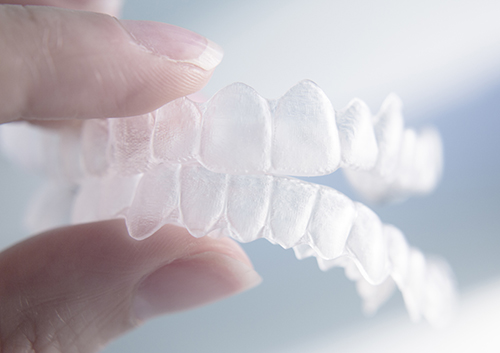Let’s Be Perfectly Clear!
February 3rd, 2021

One of the most common reasons for choosing clear aligners is that they are just that—clear! You can achieve a healthy, beautiful smile without the more obvious wires and brackets of traditional braces. But if your aligners are noticeably stained well before it’s time to replace them, you can be facing days or weeks of self-conscious smiles.
Luckily, this problem is preventable. Let’s look at some of the common causes of aligner discoloration and how to avoid them.
- Beverages that Stain Teeth Stain Aligners
You take your aligners out to eat, of course, but do you always remember to remove them when you drink a beverage? Red wines, coffee, tea, dark juices, and sodas don’t just cause enamel staining—they can discolor your aligners as well. Even worse, drinking an acidic or sugary drink with your aligners on gives that acidic, sugary beverage an opportunity to bathe your teeth in acids and sugar over a period of time. Keep your aligners (and your enamel) protected by removing them when you drink anything other than water, and brush your teeth before you replace them. If you absolutely can’t remove aligners, a straw will reduce the risk of staining.
- Soaking in Mouthwash
Mouthwash is a way to keep your teeth and mouth fresh-smelling and free from bacteria. You also want your aligners to stay fresh and bacteria-free. So, what could be the problem in giving your aligners a good soak? Well, sometimes a colorful mouthwash can stain your aligners to match! If you’re not a fan of tinted aligners, talk to us about the safest ways to use mouthwash with your appliance.
- Using Harsh Cleaners
There are products specifically made for aligners which will keep them their cleanest and clearest. Harsh cleaners and even toothpastes can be abrasive, leaving visible scratches or cloudiness. We’re happy to recommend the best and safest cleaning products for your aligners.
- Inadequate Cleaning
Plaque, that bacteria film that can stick to your enamel and around your gum line, can also stick to your aligners. If you notice a white film on your appliance, it could be plaque. Thorough and regularly scheduled cleanings are essential. Talk to us about the best schedule and methods for keeping your aligners not only clear, but sanitary.
What if, despite taking precautions, your aligners do get stained? If your aligners are new, we might be able to offer you some suggestions to get you through the next week or so. If you are almost ready for your next set of aligners, you might have no problem waiting. But the simplest solution to stained aligners is prevention.
Talk to Dr. Kevin Mancini at our Hampstead, NC and Jacksonville, NC office about how to keep your aligners looking their best—and least visible. Whether it’s diet suggestions or the most effective soaking and cleaning techniques, we have the answers to ensure your brightest, most confident smile. After all, isn’t that one of the reasons you chose clear aligners?



